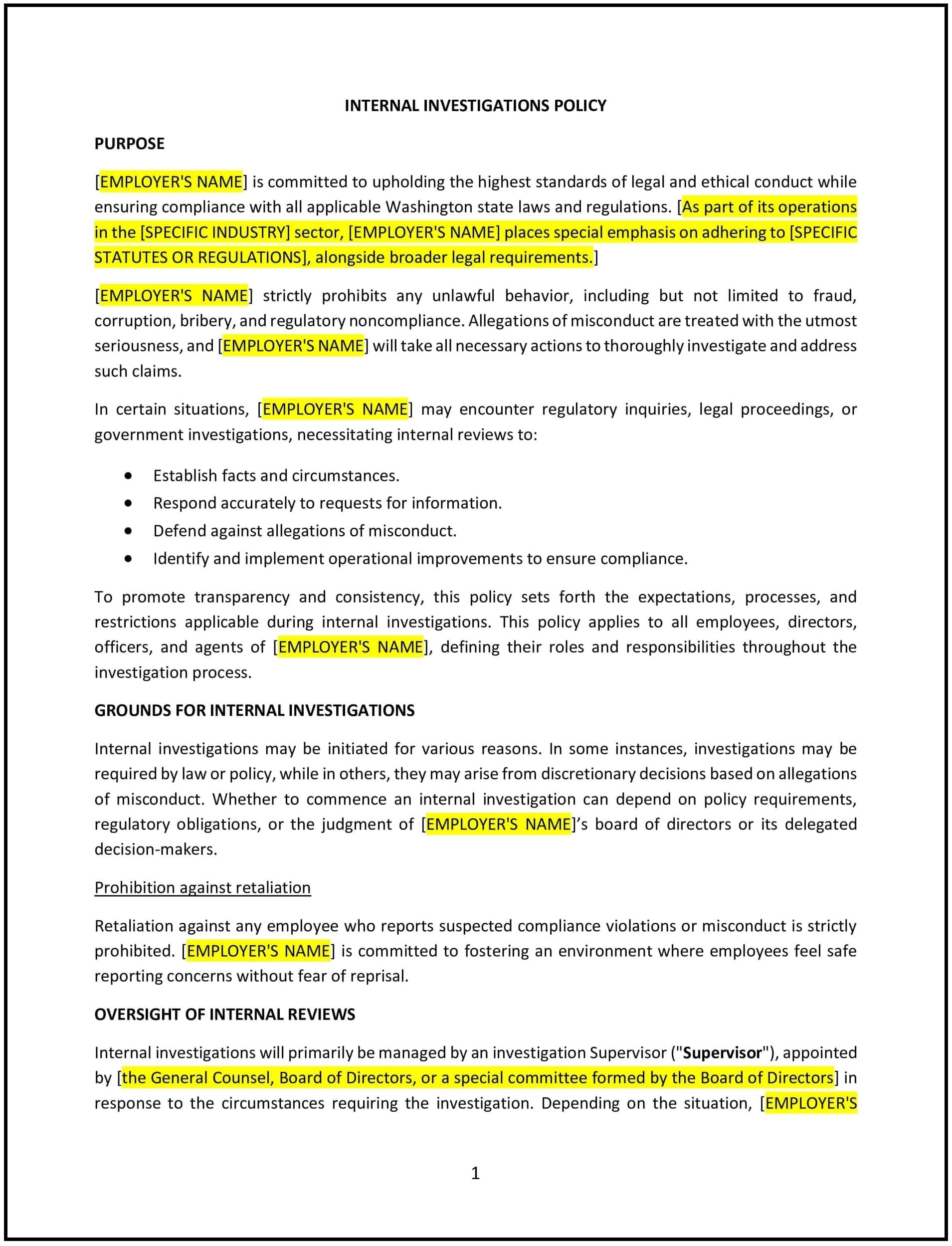Internal investigations policy (Washington): Free template
Got contracts to review? While you're here for policies, let Cobrief make contract review effortless—start your free review now.

Customize this template for free
This internal investigations policy is designed to help Washington businesses conduct thorough, fair, and legally compliant investigations into workplace issues such as employee misconduct, harassment, fraud, or violations of company policies. The policy outlines the procedures for initiating, conducting, and documenting internal investigations, ensuring that the process is unbiased, transparent, and consistent with state and federal laws.
By adopting this policy, businesses can foster a workplace environment of accountability, fairness, and respect, while minimizing legal risks and enhancing compliance with employment laws.
How to use this internal investigations policy (Washington)
- Define the scope of investigations: Clearly outline the types of issues or incidents that may trigger an internal investigation, such as allegations of misconduct, discrimination, harassment, theft, fraud, or violations of company policies. The policy should specify when an investigation is necessary and under what circumstances it will be initiated.
- Appoint an investigation team: Designate qualified personnel, such as HR representatives, legal counsel, or a third-party investigator, to lead or assist with investigations. The policy should ensure that the investigation team is impartial, objective, and properly trained in conducting investigations.
- Establish a clear process: The policy should outline the steps involved in an internal investigation, from the initial report or complaint to the final resolution. This may include the following steps: receiving the complaint, gathering evidence, interviewing witnesses, documenting findings, and taking appropriate corrective action.
- Maintain confidentiality: The policy should emphasize the importance of confidentiality throughout the investigation process. Employees involved in the investigation, including witnesses and investigators, should be instructed to keep the details of the investigation confidential to protect the privacy of all parties and prevent retaliation.
- Protect employees from retaliation: The policy must include provisions that protect employees from retaliation for participating in an investigation, whether as a complainant, witness, or subject of the investigation. Retaliation against employees for cooperating with investigations can result in disciplinary action.
- Provide clear documentation procedures: The policy should specify how investigations will be documented, including maintaining records of interviews, evidence, findings, and any corrective actions taken. Documentation should be accurate, thorough, and securely stored to enhance compliance and accountability.
- Ensure legal compliance: The policy should align with Washington state and federal laws, such as the Washington Law Against Discrimination (WLAD), Title VII of the Civil Rights Act, and other relevant employment regulations. It should ensure that investigations are conducted in a manner that respects employees’ rights and complies with applicable legal requirements.
- Review and update regularly: Periodically review and update the policy to ensure it remains compliant with changes in Washington state laws, federal regulations, and best practices for workplace investigations. Regular updates will help ensure the policy stays relevant and effective.
Benefits of using this internal investigations policy (Washington)
This policy offers several benefits for Washington businesses:
- Promotes fairness and accountability: By establishing a clear, standardized process for conducting investigations, the policy ensures that all employees are treated fairly and held accountable for their actions. It also creates a transparent system for addressing workplace issues.
- Reduces legal risks: By ensuring that investigations are conducted legally, impartially, and thoroughly, businesses can reduce the risk of lawsuits, regulatory penalties, or reputational damage resulting from mishandled investigations or failure to address misconduct.
- Protects employee rights: The policy ensures that employees are treated with dignity and respect during investigations, protecting their rights to privacy, fairness, and non-retaliation. This can contribute to improved employee morale and trust in the company.
- Supports a positive workplace culture: A clear and fair investigation process demonstrates the company’s commitment to maintaining a respectful and safe workplace for all employees. This can foster a positive work environment, reduce workplace conflict, and increase employee engagement.
- Enhances management effectiveness: By providing managers with clear guidelines for handling internal investigations, the policy improves their ability to address issues proactively and effectively. This enhances overall organizational effectiveness and supports a culture of continuous improvement.
- Promotes compliance with laws: The policy helps businesses comply with Washington state and federal laws related to workplace investigations, reducing the risk of legal complications and ensuring adherence to best practices in employment law.
Tips for using this internal investigations policy (Washington)
- Communicate the policy clearly: Ensure that all employees are aware of the internal investigations policy and understand how to report workplace issues. Include the policy in the employee handbook, review it during onboarding, and provide periodic training on investigation procedures and their rights.
- Provide training for investigators: Designate qualified personnel to lead investigations, and ensure they receive training in conducting impartial and legally compliant investigations. This training should cover interviewing techniques, documentation procedures, and handling sensitive issues.
- Ensure transparency throughout the process: While maintaining confidentiality, ensure that employees involved in investigations are informed about the process and what to expect. This helps build trust and ensures that employees feel respected throughout the investigation.
- Follow up on outcomes: Once the investigation is complete, communicate the outcome to the involved parties, as appropriate. Taking corrective action, if necessary, and ensuring that all parties understand the outcome helps resolve issues and maintain a healthy work environment.
- Keep detailed records: Ensure that all aspects of the investigation are documented thoroughly, including the timeline, evidence, interview summaries, and any actions taken. Securely store these records to protect privacy and maintain a clear audit trail.
- Review and update regularly: Periodically review the policy to ensure it remains compliant with Washington state laws, federal regulations, and any changes in the company’s operations or best practices for handling investigations. Regular updates will help keep the policy relevant and effective.